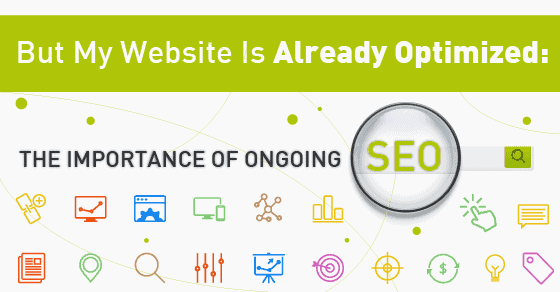When you had your business’s very first website built – or even when you recently had it redesigned – you probably made sure that all your SEO ducks were in a row, ensuring that the designers were carefully optimizing every aspect of your site to be easily found and ranked well by search engines. Right?
So when someone starts talking about ongoing search engine optimization, you think, What for? My site is already optimized!
And you wouldn’t be wrong.
Yes, your site was optimized for search engines at the time it was designed and built. But effective SEO is actually much, much more than a one-time fix.
SEO is not simply a matter of putting certain keywords in the right places on a website, or even setting up the coding of a site correctly. Those are important aspects of it, of course, but definitely not the whole picture.
In order to explain why ongoing SEO is so vital to your business’s success online, we’ve assembled a list of 5 necessary, ongoing SEO tasks that must be done in order to keep your site on Google’s good side.
1. Ongoing Review of Analytics:
If your site has been optimized, that’s great. But now someone needs to monitor the results the SEO work is bringing you, to see how well it’s really working for you. You may discover through analytics that some of your original SEO work is just not bringing in any traffic, or that other efforts are now leading more customers to your door instead. There may be pages of your site that you discover just aren’t effective for SEO purposes after all, and need to be changed. You may even learn that your traffic is interacting with your content and the current optimization of your site in unexpected ways that you can take advantage of. Continually reviewing your website’s analytics, and then making changes to your site based on what you learn, is vital to staying in Google’s good graces.
2. Ongoing Link Earning Efforts:
Link earning is an important part of SEO, but it must be done right, or it will hurt you, rather than help you. Google wants to see links to your website on other high-quality sites, not on fly-by-night link farms, or even dubious guest blogging sites. And the only way to get those links is to slowly but surely reach out, build relationships, and share your content with the owners of those high-quality sites. This process takes time – and that’s the way Google likes it, as well. Search engines reward slow, gradual, natural growth in this area. Websites that pop up out of nowhere with hundreds of links to them already in place raise red flags, and will probably be penalized.
3. Ongoing Content Creation:
Fresh content is a must in order to rank well on Google – that’s why blogs are so widespread. And blogs are an important way to keep that new content coming. But content creation doesn’t only mean blogging. Websites with only one or two pages of static content and a blog will never rank as well as sites to which new pages are constantly being added, old pages are constantly being tweaked to reflect the latest insights gained from analytics, and a blog is being updated on a regular basis, as well. With continuous new content, you can also reach a wider audience, since you can harness the power of different keywords each time you augment it.
4. Ongoing Analysis of the Competition:
You may have a perfectly optimized website, with fresh content and links back and constant tweaks based on analytics. But what happens when your competition suddenly gets smarter and starts ranking for keywords you used to rank for? Ongoing analysis of your competition allows you to make changes to your own site as needed to make sure you maintain your ranking.
5. Ongoing Attention to Algorithm Changes:
Google makes algorithm changes on a regular basis, and not only that, but also changes their views on such things as guest blogging every so often. If your site was optimized before the latest algorithm update, it’s important to take another look. SEO must evolve along with the search engines themselves, or it will be obsolete in no time flat.
So if you’re serious about search engine optimization for your business’s website, then ongoing SEO is the only way to go. In order to remain competitive in the world of online marketing – and in order to remain on Google’s good side – ongoing SEO is vital.
What steps do you currently take to keep your SEO fresh? Share your tactics with us in the comments section below!




